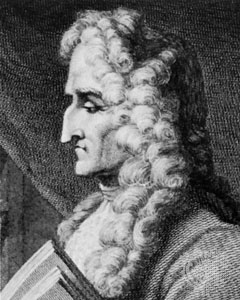
Thomas D'Urfey was one of the most prolific and popular poets and musicians of his age, famous for his comic skills. He entertained five monarchs and wrote over 32 plays and 500 songs. He published the several- volume work, Wit and Mirth: or, Pills to Purge Melancholy, which included his songs and others as well as older airs and ballads.
D'Urfey (he did not use the apostrophe in his name until 1683) was born in Devonshire around 1653. Although he claimed a family association with Honore d'Urfe, the author of L'Astree, this claim has been questioned. It has also been claimed that D'Urfey's father or grandfather was a Huguenot who fled from La Rochelle in 1628, but there is no evidence for this.
Although some sources state that D'Urfey was trained in Law, documents of the time suggest that D'Urfey began work as a scrivener's apprentice. He turned almost immediately from that occupation to entertainment. His first play, The Siege of Memphis was staged in September 1676 and was a failure. However, in November 1676 he turned his efforts to comedy. Madam Fickle was produced at the Dorset Garden Theatre. Charles II and the Duke of Ormonde attended and Ormonde presented D'Urfey to the king. Despite a distinct stutter "except when singing or swearing" and a decidedly unhandsome appearance, Thomas D'Urfey became an intimate of Charles.(1) His voice and his talent for composing the sort of witty songs Charles enjoyed, along with his "good natured willingness to be the butt of a jest as much as the author of one" (2) made him nearly a court jester as well as singer and songwriter for Charles. Except for a brief period in 1689 when he was a singing teacher at a girls school he served each succeeding monarch and many wealthy patrons.
D'Urfey's songs were of three types: political songs, court songs and country songs. His political songs invariably celebrated the monarch - from Stuart to Hanover. He wrote numerous political satires. His country songs were coarse and popular, dealing with common folk and their relationships. His words were set to music by Henry Pucell, Dr. John Blow, John Eccles and others - nearly forty composers in all. His songs were often labelled as vulgar - not without reason. One of his popular songs was The Fart; Famous for its Satyrical Humour in the Reign of Queen Anne. His musical reputation was one of carelessness, and his music did not enjoy a great reputation. D'Urfey did not deny it but stated that "irregularities disappear when his songs are sung." (3) D'Urfey was also well aware that his music was looked down upon. "The Town may da-da-damn me for a poet," he said, "but they si-si-sing my Songs for all that." (4)
A friend of essayists Richard Steele and Joseph Adidson, D'Urfey often quarrelled with other poets of the time and was the subject of many less than flattering verses. His play Love for Money was attacked in a clever pamphlet Wit for Money: Or, Poet Stutterer. He was ridiculed for his pretensions. Despite a lack of funds he insisted upon being accompanied by a page and in 1683 added the apostrophe to his name to promote his association with aristocracy. An amusing eleven verse poem was printed after Durfy changed the spelling of his name to D'Urfey. In 1689 he fought a duel with a musician named Bell. Tom Brown wrote of the duel:
Betwixt them there happen'd a horrible Clutter,
Bell set up the loud Pipes, and Durfey did splutter.
Draw, Bell, wer't thou Dragon, I'll spoil they soft Note,
Thy squeaking, said t'other, for I'll cut thy Throat.
With a Scratch on the Finger the Duel's dispatch'd,
Thy Clineas (Oh Sidney!) was never so match'd. (4)
Thomas D'Urfey's music was the rage among the common people. Pope, in a letter of 1710 wrote: "Dares any Man speak against him who has given so many Men to eat? So may it be said of Mr. Durfey to his Detractors: What? Dares any one despise him, who has made so many Men drink? Alas, Sir! This is a Glory which neither you nor I must ever pretend to." (5)
Thomas D'Urfey died in 1723. In 1726 the following epitaph was printed:
Here lyes the Lyrick, who with Tale and Song,
Did Life to threescore and ten prolong;
His Tale was pleasant, and his Song was sweet;
His Heart was chearful - but his Thirst was great.
Grieve, Reader, grieve, that he, too soon grown old,
His Song has ended, and his Tale has told.(6)
If Thomas D'Urfey's tale was told, his music continued. His songs were taken up in ballad operas. Ten of the 68 airs in The Beggar's Opera are D'Urfey's songs. Many were popular into the nineteenth century.
(1)Day, 6
(2)Ibid., 6
(3)Ibid.,39
(4)Ibid.,30
(5)Ibid.,30
(6)Ibid., 28